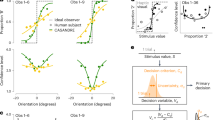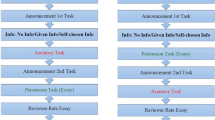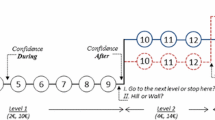Abstract
Zakay and Glicksohn have recently found a negative relationship between overconfidence and performance in a multiple-choice test. It is argued here that, contrary to what they say, the result could be artificial.
Similar content being viewed by others
References
ANTHONEY, T. R. (1986). A discrepancy in objective and subjective measures of knowledge: Do some medical students with learning problems delude themselves? Medical Education, 20, 17–22.
KOEHLER, R. A. (1974). Overconfidence on probabilistic tests. Journal of Educational Measurement, 11, 101–108.
RONIS, D. L., & YATES, J. F. (1987). Components of probability judgment accuracy: Individual consistency and effects of subject matter and assessment method. Organizational Behavior and Human Decision Processes, 40, 193–218.
ZAKAY, D., & GLICKSOHN, J. (1992). Overconfidence in a multiple-choice test and its relationship to achievement. The Psychological Record, 42, 519–524.
Author information
Authors and Affiliations
Rights and permissions
About this article
Cite this article
Hutchinson, T.P. On Overconfidence in Multiple-Choice Tests. Psychol Rec 44, 253–255 (1994). https://doi.org/10.1007/BF03395131
Published:
Issue Date:
DOI: https://doi.org/10.1007/BF03395131




